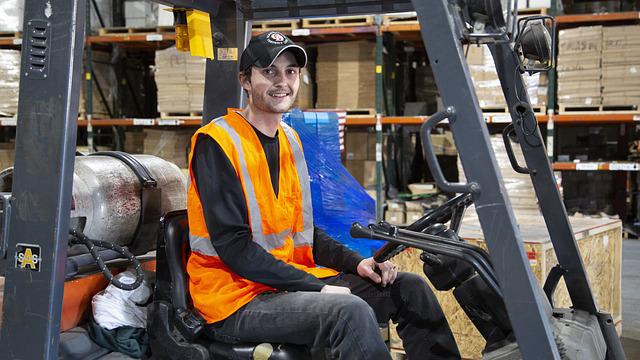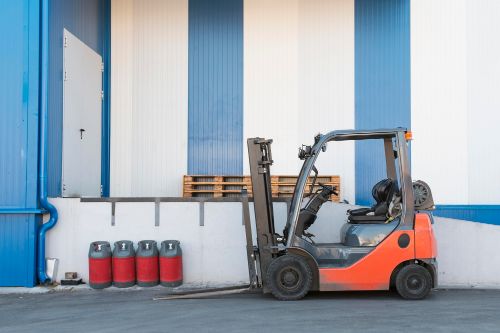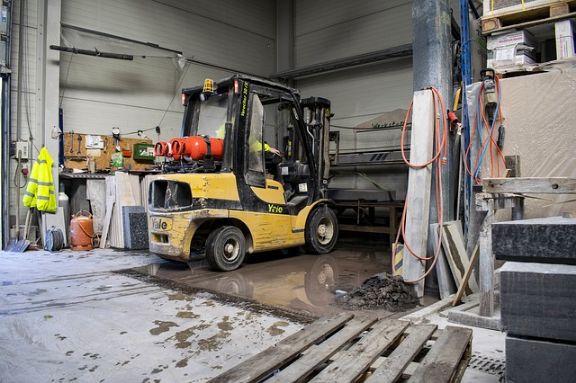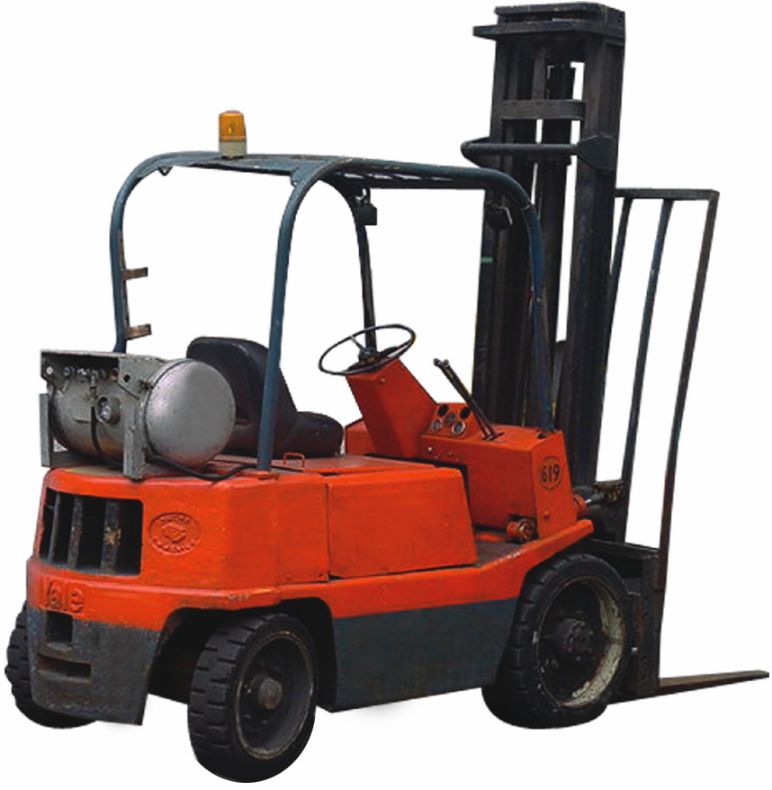
It’s been years since you bought a propane tank on your forklift; it has serviced your equipment well, it is time to give a good service back to your tank in order for it to operate safely and lengthen its lifespan.
How are you going to service the tank? Just like any other tanks, forklift propane tanks need to be recertified to keep them in good condition. When it was bought brand new, it needs to be re-certified 10 years from the date of its manufacture; however, if it was bought in used condition, the recertification is every 5 years. To ensure that the forklift propane tanks are in good working order and up-to-date with industry standards, those periods must be followed.
These periods apply whether you have a steel or aluminum type. If you’re in other countries other than the US, these periods may vary. To find out the dates, look at the collar of the tanks. Important details are stamped into the collar such as the manufacturing and expiry dates, tear weight (TW), and water storage capacity (WC).
The recertification process is done by a qualified professional or by an authorized dealer. When you notice a smell of rotten eggs or an accumulation of rust on the body, you need to check its collar to see the re-certification date, it may have already lapsed.
Sometimes, for a forklift propane tank that is too rusted, you may no longer have to re-certify it, buying a brand new tank or used one in good condition may be the better option. You can contact a local dealer in your area, it is just a phone call away.
Read related article: Forklift Propane Tank Orientation: Do These for Universal Tank
Spotting Red Flags: When to Be Concerned
Operating forklifts safely is paramount, and a large part of that safety comes from ensuring the propane tanks are in optimal condition. Knowing when to be concerned about your tank’s health can prevent accidents and ensure smoother operations. Here are some red flags you should be aware of:
- Visible Damage or Corrosion on the Tank:
- What to Look For: Check for dents, cracks, rust spots, or any other visible signs of wear and tear. Discoloration or any signs of corrosion, especially around welds or joints, should be taken seriously.
- Why It’s a Concern: Damage or corrosion can compromise the structural integrity of the tank, making it susceptible to leaks or even explosions under pressure.
- What to Do: If you notice any of these signs, it’s best to get the tank inspected immediately. It may need repairs or replacement.
- Propane Leaks or Irregularities in Gas Flow:
- What to Look For: Be alert to the smell of propane, which has a distinct odor, often described as similar to rotten eggs. Also, pay attention if your forklift’s performance seems off, like inconsistent power or stalling, as it might indicate irregular gas flow.
- Why It’s a Concern: Leaks are not just wasteful; they’re hazardous. Propane is flammable, and even a small leak can lead to a fire or explosion. Irregular gas flow can affect the forklift’s operation, which might cause accidents.
- What to Do: At the first sign of a leak or gas flow irregularity, turn off the source, evacuate the area, and get a professional to inspect the tank.
- Unusual Sounds or Behaviors from the Tank:
- What to Look For: Listen for hissing sounds, which might indicate a leak. Other unusual noises, like groaning or high-pitched whistles when the tank is in use, can be warning signs too.
- Why It’s a Concern: Unusual sounds often indicate something isn’t working as it should. This could be a faulty valve, a leak, or internal pressure issues.
- What to Do: If your tank is making strange noises, it’s best to stop using it immediately. Get it inspected by a professional to diagnose the issue.
Your forklift’s propane tank is not something to take lightly. By staying vigilant and knowing what red flags to look out for, you can ensure your operations remain safe and efficient. If in doubt, always consult with a professional or technician familiar with propane tanks. Safety first!
Read related article: What Size Propane Tank Does a Forklift Take?
The Recertification Process
When it comes to the recertification of forklift propane tanks, it’s crucial to understand the process, know who is qualified to perform these recertifications, and be aware of the required time frame for recertification. Here’s a guide to help you navigate through this process:
Step-by-Step Description of the Recertification Process
- Initial Inspection
- Visual Check: Start with a thorough visual inspection of the tank. Look for any signs of damage, corrosion, or wear and tear. This includes checking for dents, rust, or any other abnormalities that could compromise the tank’s integrity.
- Pressure Testing
- Leak Test: Perform a pressure test to ensure there are no leaks. This is usually done by applying a soapy water solution to the tank and looking for bubbles that indicate a leak.
- Pressure Retention: The tank should also be tested for its ability to hold pressure over time.
- Valve and Hose Inspection
- Safety Valves: Check all safety valves and hoses for any signs of damage or wear. Ensure they are operating correctly and replace any components that show signs of malfunction.
- Documentation Review
- Past Records: Examine previous inspection and maintenance records to ensure the tank has been consistently maintained and previous issues have been resolved.
- Certification Label Update
- Once the tank passes all the tests and inspections, update or attach a new certification label indicating the date of recertification and the due date for the next inspection.
Who is Qualified to Perform Recertifications
- Recertification should be carried out by a certified professional. This is typically someone who has received training and certification in handling and inspecting propane tanks.
- Look for individuals or companies that specialize in industrial gas services or have specific credentials in propane tank inspection and maintenance.
Time Frame for Recertification
- The standard time frame for recertifying forklift propane tanks is every 5 to 10 years, depending on your country’s regulations and the tank manufacturer’s guidelines.
- Always adhere to the most stringent standard applicable to your situation, whether it’s a legal requirement or a manufacturer’s recommendation.
Remember, ensuring that your forklift propane tanks are regularly recertified is not just a regulatory requirement, but a critical measure for maintaining safety in your workplace. Always keep track of recertification dates and plan inspections well in advance to ensure compliance and safety.
How Much Does It Cost You?
The below figures are surveyed/researched from the three (3) reputable companies in the industry. As of July 2022, the cost involved in recertifying propane tanks are the following:
| Cylinder Size | Company A | Company B | Company C |
| 20-lb Cylinder | $30 | $30 | $35 |
| 33.5-lb Cylinder | $55 | $65 | $60 |
| 43-lb Cylinder | $75 | $70 | $75 |
We did not reveal the name of each company we researched to protect their reputation. But if you refer to the above table, you may now have an idea on how much you are going to pay.
The cost of recertification depends on the following aspects:
- The capacity of the propane tank – the higher the capacity, the more costly the tank.
- The age of the tank – the older the tank, the higher the cost is.
- The professional or company doing the recertification – the more established and reputable the company is, the higher the rates are.
- Material of the tank – steel vs aluminum
- Damage to the tank – such as dents and corrosion
How to Recertify a Forklift Propane Tank?
Ordinarily, during inspection of the tank, you may have noticed that its expiration has crossed. This is the only time you act for its retest.
Retest is done by a qualified technician, usually employed by a dealer or supplier. You may instinctively call one of these companies to do the recertification which is the right thing to do. If you just have a few tanks due for retesting, you can have them dropped off at the company premises; or if you have a large number of tanks, you can have an agreement with the company to pick them up.
Some companies may offer an exchange for an expired tank which is a good option to take especially when the tank is relatively old and corroded. You just have to pay extra for the exchange.
Be reminded, according to 49 CFR § 180.205 (b), that no individual is allowed to recertify unless he is a qualified technician or skilled professional who is trained to do such. This regulation has to be complied with as it is a safety risk to let someone unqualified do the recertification.
Government Regulations Related to Propane Tanks Requalification
With regard to this matter, the Department of Transportation’s (DOT) Requalification/Retesting (49 CFR § 180.205) is enforced. The regulation details everything about recertification plus other complete details. To read more about the regulation, see this page.
Understanding the Regulations for Forklift Propane Tanks:
If you’re using forklift propane tanks, you should be aware that they’re governed by specific safety regulations. Here’s what you need to know:
- Tank Manufacturing Standards: When you buy a propane tank, it should meet certain safety standards. This covers everything from the material used to its thickness and how it’s made. Ensure that your tank is compliant with these standards.
- Valve and Connection Guidelines: Make sure you’re using the right valves, connectors, and fittings for your tank. The regulations are specific about which types are safe and compatible with propane tanks.
- Expiration Dates: Check the manufacture date on your tank. Depending on where you are, you might need to get it recertified after 5, 7, 10, or even 12 years from this date.
The Risks of Not Recertifying Your Tank:
If you overlook the recertification of your tank, you could face several consequences:
- Monetary Fines: You can be slapped with a fine if regulatory bodies catch you operating with an expired or non-compliant tank.
- Operational Halts: If your tank isn’t up to code, you might have to stop using it until it passes the necessary inspections. This could disrupt your operations.
- Legal Troubles: If there’s an accident and your tank wasn’t certified, you could be in for some legal headaches, both financially and reputation-wise.
The Recertification Process – What to Expect:
Key Inspection Criteria:
When you send your tank for recertification, here’s what inspectors will typically look for:
- Structural Checks: They’ll examine your tank for cracks, rust, or any signs that could mean it’s unsafe.
- Valve Tests: They’ll ensure that the valves are in good shape, sealing properly, and not leaking.
- Markings Inspection: Your tank should have specific markings or stamps showing it meets the required standards.
- Pressure Assessment: Your tank will undergo a pressure test to confirm it can hold propane safely.
How Often Should You Recertify?
The frequency of recertification depends on:
- The Tank’s Age: Count the years from its manufacturing date. That’ll give you an idea of when it’s due for a check.
- How Often You Use It: If you’re using your tank a lot, it might need inspections sooner.
- Where It’s Stored: If your tank is exposed to extreme conditions or potential corrosion, consider checking it more often.
What If Your Tank Doesn’t Pass?
If your tank fails recertification:
- It’s Off-Limits: You’ll have to stop using it immediately.
- Repairs or Reconditioning: Sometimes, you can get the tank fixed, and after retesting, it might pass.
- Proper Disposal: If your tank can’t be fixed, ensure you dispose of it safely and in line with environmental regulations.
The goal of this regulation is to ensure that all propane tanks in the United States are up to date with safety standards and that they don’t pose a risk to the health and safety of the people working with these containers.
Read related article: How to Choose Forklift Propane Cylinders for Your Application
Governing Organizations for the Safety of Use Propane
There are a few different organizations that govern the safe use of propane. The first is the National Fire Protection Association (NFPA). The NFPA is a national organization that sets standards for fire safety. The NFPA 58 was developed to cover the storage, handling, transportation, and use of liquefied petroleum gas. This standard covers the inspection, testing, and recertification of propane tanks. It is important to note that the NFPA does not actually recertify propane tanks, but rather provides the guidelines for safe use and storage.
The second organization is the American Society of Mechanical Engineers (ASME). ASME is a national organization that sets standards for mechanical engineering. They have a standard for the recertification of propane tanks, which is ASME Pamphlet P-1. This standard covers the inspection, testing, and recertification of propane tanks. It is important to note that the ASME does not actually recertify propane tanks, but rather provides the standards for recertification.
The third organization is the Department of Transportation (DOT). The DOT is a national organization that sets standards for transportation. They have a standard for the recertification of propane tanks, which is DOT CFR 49. This standard covers the cylinder requalification inspection and marking guidance. It is important to note that the DOT does not actually recertify propane tanks, but rather provides the standards for recertification.
OSHA has its own standards concerning about the storage and handling of liquefied petroleum gas (LPG) (29 CFR 1910.110) and fire protection and prevention (29 CFR 1926.153).
In conclusion, there are three main organizations that recertify propane tanks: the NFPA, the ASME, the DOT and OSHA. Each of these organizations has their own standard for the recertification of propane tanks.
Stay Safe – Periodically Check Your Forklift Tank’s Collar
If your company has a large fleet of propane-powered forklifts, periodically checking the expiry date of each of the tanks being used by the operators is a good safety practice. Failure to check the expiry date is quite common, but it doesn’t have to remain that way.
Keep a record of all the propane tanks in the workplace. You can create a template of an inspection checklist indicating the identification number, type of tank (steel or aluminum), expiry date, manufactured date, and other data that may be deemed necessary for the recording.
At least once or twice a month, you can have someone verify by going through the inspection checklist to find out what are cylinders nearing expiration or those that are already due for re-certification. In this way, you feel comfortable knowing that a large number of forklift tanks are monitored to prevent lapses in re-certification.
Some workers or superiors may think that they can wait until their next equipment inspection or annual inspection before they get their forklift propane tanks re-certified, but that’s not the case. You need to follow the re-certification period as mentioned above or else your tank will become inoperative and a safety hazard.
Some Safety Guidelines to Take Note Of
- If you intend to refill your container, and the refilling company finds out that it is due for recertification, it may not be allowed to be refilled. It is a safety hazard to refill an expired tank.
- Completely empty the tanks of gas before transporting. In this way, you don’t post risks such as ignition and explosion.
- Regularly inspect your container and maintenance checklist and repair history to track their conditions. It is just maintaining a car’s preventive maintenance schedule.
- Don’t let forklift operators use expired forklift propane tanks. This may cause gas leaks leading to an accident in the workplace.
Importance of Regular Recertification
Regularly recertifying your forklift propane tanks isn’t just a tick on a compliance checklist. It’s about ensuring safety, and efficiency, and protecting your interests. Let’s delve into why it’s crucial for you:
- Enhancing Your Workplace Safety: Understanding the Potential Hazards of Uncertified Tanks:
- Safety First: By ensuring your tanks are regularly recertified, you’re directly reducing potential risks in your workspace.
- Identifying Hidden Dangers: Uncertified tanks can harbor unseen issues, from weakened structures to malfunctioning valves. These aren’t just operational hurdles; they can be downright dangerous.
- For Your Team: Your team trusts you to provide a safe working environment. Regularly certifying equipment, like propane tanks, solidifies this trust and fosters a safety-conscious culture.
- Ensuring Optimal Tank Performance and Efficiency: The Value of Peak Performance:
- Smooth Operations: With a certified tank, you can count on a consistent gas flow, meaning no unexpected forklift downtimes.
- Avoiding Unexpected Hiccups: Tanks with hidden issues can disrupt your operations. From inconsistent gas flow causing machinery to falter to longer downtimes, these disruptions can add up in lost time and money.
- Saving on Maintenance Costs: When you catch issues early through recertification, you can sidestep more extensive, pricier repairs or replacements in the future.
- Addressing Liability Concerns: Safeguarding Your Business Interests: Why Certification Matters in the Legal Realm:
- Building a Legal Defense: By keeping your tanks certified, you’re showing a commitment to safety. This proactive approach can be invaluable if you ever face legal challenges.
- Protecting Your Reputation: Accidents can tarnish your business reputation. Regular recertification acts as a preventive measure, ensuring you maintain a positive public image.
- Financial Guardrails: An accident stemming from an avoidable issue can result in hefty lawsuits. Beyond the immediate financial costs, you might see a spike in your insurance premiums.
Regularly recertifying your forklift propane tanks is an investment in your business’s safety, efficiency, and reputation. It’s a proactive measure that ensures you’re always a step ahead, safeguarding your team and your interests.
You Might Want to Watch This
Consequences of Not Recertifying
Understanding the consequences of not recertifying forklift propane tanks is crucial for maintaining a safe and legally compliant workplace. Here’s a breakdown of the potential risks and legal implications, along with real-world examples to illustrate the importance of staying up to date with recertifications.
Potential Risks of Not Recertifying Forklift Propane Tanks
- Safety Hazards
- Risk of Leaks and Explosions: An uncertified tank may have undetected leaks or structural weaknesses, increasing the risk of propane leaks, which can lead to fires or explosions.
- Injury to Personnel: Employees working with or near faulty propane tanks are at higher risk of injury due to potential malfunctions.
- Operational Downtime
- Equipment Failure: An uncertified tank is more likely to fail, leading to operational downtime and loss of productivity.
- Costly Repairs and Replacements: Neglecting recertification can result in the need for more extensive repairs or even full replacement of propane tanks, which can be costly.
Legal Implications of Failing to Recertify
- Regulatory Fines and Penalties
- Non-compliance with safety standards and regulations can lead to substantial fines and legal penalties for your company.
- Legal Liability
- In the event of an accident involving an uncertified propane tank, your company could face legal action for negligence.
- This could include compensation claims from injured employees or third parties.
- Insurance Issues
- Insurance policies may not cover incidents arising from the use of uncertified equipment, leading to significant financial losses.
Real-world Examples and Case Studies
- Example 1: In a manufacturing facility, a forklift propane tank that was overdue for recertification developed a leak, leading to a small fire. This resulted in minor injuries and a temporary shutdown of the facility. The company faced fines for non-compliance with safety regulations.
- Example 2: A logistics company faced legal action after a forklift propane tank exploded, causing significant property damage and injury. Investigation revealed that the tank had not been recertified for over 10 years, leading to severe legal and financial consequences for the company.
These examples underscore the importance of adhering to recertification schedules for forklift propane tanks. Regular recertification not only ensures compliance with legal standards but also significantly reduces the risk of accidents, thereby safeguarding your employees and business operations.
Regular Maintenance is Important
When it comes to maintaining forklift propane tanks and ensuring their timely recertification, adopting best practices is key to ensuring safety, efficiency, and compliance in your workplace. Here are some tips and strategies you can use:
Tips for Maintaining Forklift Propane Tanks
- Regular Inspections
- Conduct routine visual inspections for signs of wear, corrosion, or damage. Look for dents, rust, or any deformations.
- Check hoses and connections for leaks or signs of wear.
- Proper Handling and Storage
- Always handle propane tanks with care to prevent damage.
- Store tanks in a designated, well-ventilated area, away from high traffic and potential impact zones.
- Immediate Repairs
- Address any issues immediately. If you find a leak or damage, take the tank out of service until it’s repaired or replaced.
- Employee Training
- Train your staff on safe handling practices and what to do in case of a propane leak or other emergencies.
Strategies to Ensure Timely Recertification
- Scheduling and Reminders
- Keep a recertification schedule and set reminders well in advance of the due dates.
- Consider using maintenance software or a digital calendar for alerts.
- Staying Informed
- Keep up to date with the latest regulations and standards for propane tank recertification.
- Attend industry workshops or seminars if available.
- Working with Certified Professionals
- Choose certified professionals for recertification. Establish a relationship with a reliable service provider who understands your needs.
Role of Record-Keeping and Documentation in Managing Recertifications
- Maintaining Detailed Records
- Keep detailed records of each tank’s purchase date, recertification dates, maintenance history, and any repairs or incidents.
- Use a digital system for record-keeping to streamline the process and ensure easy access to information.
- Legal and Compliance Documentation
- Keep copies of all recertification documents and certificates. These may be required for audits or inspections.
- Document any training sessions or safety meetings related to propane tank handling and maintenance.
- Review and Audit
- Regularly review your records to ensure no tank goes beyond its recertification date.
- Conduct internal audits to ensure your record-keeping aligns with actual practices.
Remember, proactive maintenance and diligent record-keeping are not just about complying with regulations; they are about ensuring a safe working environment. By following these best practices, you can effectively manage the maintenance and recertification of your forklift propane tanks, ensuring they remain safe and efficient in your operations.
To Make a Conclusion
The recertification of forklift propane tanks is not just a regulatory requirement; it’s a critical component of maintaining a safe and efficient workplace. The process of regular recertification ensures that these tanks are safe to use, compliant with legal standards, and functioning optimally. Neglecting this responsibility can lead to serious safety hazards, legal repercussions, and operational inefficiencies.
The key takeaways from our discussion include the importance of understanding the recertification process, recognizing the qualifications of those who perform recertifications, and adhering to the recommended time frames. Additionally, implementing best practices for maintenance and record-keeping is essential in managing the lifecycle of forklift propane tanks effectively.
By staying informed and proactive about recertification, you not only ensure compliance with safety regulations but also demonstrate a commitment to the well-being of your employees and the overall health of your operations. In essence, the recertification of forklift propane tanks is a vital aspect of responsible and effective workplace management.

Mike is an experienced propane technician with over 15 years of professional experience in the field. He has dedicated his career to helping customers with their propane needs, from installation to maintenance and repair. Together with Jeremy, he co-founded this website to provide useful information and guidance to customers seeking reliable propane services.



